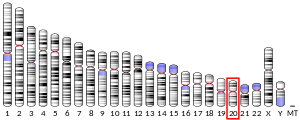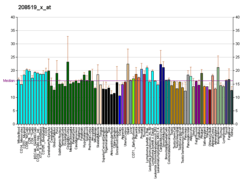GNRH2
Progonadoliberin-2 is a protein that in humans is encoded by the GNRH2 gene.[3][4][5]
| GNRH2 | |||||||||||||||||||||||||
|---|---|---|---|---|---|---|---|---|---|---|---|---|---|---|---|---|---|---|---|---|---|---|---|---|---|
| Identifiers | |||||||||||||||||||||||||
| Aliases | GNRH2, GnRH-II, LH-RHII, gonadotropin releasing hormone 2 | ||||||||||||||||||||||||
| External IDs | OMIM: 602352 HomoloGene: 128642 GeneCards: GNRH2 | ||||||||||||||||||||||||
| |||||||||||||||||||||||||
| |||||||||||||||||||||||||
| |||||||||||||||||||||||||
| Orthologs | |||||||||||||||||||||||||
| Species | Human | Mouse | |||||||||||||||||||||||
| Entrez |
| ||||||||||||||||||||||||
| Ensembl |
| ||||||||||||||||||||||||
| UniProt |
| ||||||||||||||||||||||||
| RefSeq (mRNA) |
| ||||||||||||||||||||||||
| RefSeq (protein) |
| ||||||||||||||||||||||||
| Location (UCSC) | Chr 20: 3.04 – 3.05 Mb | n/a | |||||||||||||||||||||||
| PubMed search | [2] | n/a | |||||||||||||||||||||||
| Wikidata | |||||||||||||||||||||||||
| |||||||||||||||||||||||||
The protein encoded by this gene is a preproprotein that is cleaved to form a secreted 10 aa peptide hormone, QHWSHGWYPG.[6] The secreted decapeptide regulates reproduction in females by stimulating the secretion of both luteinizing- and follicle-stimulating hormones. Three transcript variants that encode unique proproteins but the same peptide hormone have been found for this gene.[5] The peptide belongs to gonadotropin-releasing hormone family.
References
- GRCh38: Ensembl release 89: ENSG00000125787 - Ensembl, May 2017
- "Human PubMed Reference:". National Center for Biotechnology Information, U.S. National Library of Medicine.
- White RB, Eisen JA, Kasten TL, Fernald RD (Feb 1998). "Second gene for gonadotropin-releasing hormone in humans". Proc Natl Acad Sci U S A. 95 (1): 305–9. doi:10.1073/pnas.95.1.305. PMC 18209. PMID 9419371.
- Chen A, Ganor Y, Rahimipour S, Ben-Aroya N, Koch Y, Levite M (Nov 2002). "The neuropeptides GnRH-II and GnRH-I are produced by human T cells and trigger laminin receptor gene expression, adhesion, chemotaxis and homing to specific organs". Nat Med. 8 (12): 1421–6. doi:10.1038/nm801. PMID 12447356.
- "Entrez Gene: GNRH2 gonadotropin-releasing hormone 2".
- "GNRH2 - Progonadoliberin-2 precursor - Homo sapiens (Human) - GNRH2 gene & protein". uniprot. Retrieved 19 January 2019.
Further reading
- Neill JD (2002). "GnRH and GnRH receptor genes in the human genome". Endocrinology. 143 (3): 737–43. doi:10.1210/en.143.3.737. PMID 11861490.
- Leung PC, Cheng CK, Zhu XM (2004). "Multi-factorial role of GnRH-I and GnRH-II in the human ovary". Mol. Cell. Endocrinol. 202 (1–2): 145–53. doi:10.1016/S0303-7207(03)00076-5. PMID 12770744.
- Limonta P, Moretti RM, Marelli MM, Motta M (2004). "The biology of gonadotropin hormone-releasing hormone: role in the control of tumor growth and progression in humans". Frontiers in Neuroendocrinology. 24 (4): 279–95. doi:10.1016/j.yfrne.2003.10.003. PMID 14726258.
- Bloch B, Gaillard RC, Culler MD, Negro-Vilar A (1992). "Immunohistochemical detection of proluteinizing hormone-releasing hormone peptides in neurons in the human hypothalamus". J. Clin. Endocrinol. Metab. 74 (1): 135–8. doi:10.1210/jc.74.1.135. PMID 1727812.
- Chen A, Laskar-Levy O, Ben-Aroya N, Koch Y (2001). "Transcriptional regulation of the human GnRH II gene is mediated by a putative cAMP response element". Endocrinology. 142 (8): 3483–92. doi:10.1210/en.142.8.3483. PMID 11459794.
- Deloukas P, Matthews LH, Ashurst J, et al. (2002). "The DNA sequence and comparative analysis of human chromosome 20". Nature. 414 (6866): 865–71. doi:10.1038/414865a. PMID 11780052.
- Gründker C, Günthert AR, Millar RP, Emons G (2002). "Expression of gonadotropin-releasing hormone II (GnRH-II) receptor in human endometrial and ovarian cancer cells and effects of GnRH-II on tumor cell proliferation". J. Clin. Endocrinol. Metab. 87 (3): 1427–30. doi:10.1210/jc.87.3.1427. PMID 11889221.
- Chen A, Zi K, Laskar-Levy O, Koch Y (2002). "The transcription of the hGnRH-I and hGnRH-II genes in human neuronal cells is differentially regulated by estrogen". J. Mol. Neurosci. 18 (1–2): 67–76. doi:10.1385/JMN:18:1-2:65. PMID 11931351.
- Strausberg RL, Feingold EA, Grouse LH, et al. (2003). "Generation and initial analysis of more than 15,000 full-length human and mouse cDNA sequences". Proc. Natl. Acad. Sci. U.S.A. 99 (26): 16899–903. doi:10.1073/pnas.242603899. PMC 139241. PMID 12477932.
- Cheng CK, Hoo RL, Chow BK, Leung PC (2004). "Functional cooperation between multiple regulatory elements in the untranslated exon 1 stimulates the basal transcription of the human GnRH-II gene". Mol. Endocrinol. 17 (7): 1175–91. doi:10.1210/me.2002-0418. PMID 12663744.
- Islami D, Bischof P, Chardonnens D (2004). "Possible interactions between leptin, gonadotrophin-releasing hormone (GnRH-I and II) and human chorionic gonadotrophin (hCG)". Eur. J. Obstet. Gynecol. Reprod. Biol. 110 (2): 169–75. doi:10.1016/S0301-2115(03)00185-4. PMID 12969578.
- Chou CS, Beristain AG, MacCalman CD, Leung PC (2004). "Cellular localization of gonadotropin-releasing hormone (GnRH) I and GnRH II in first-trimester human placenta and decidua". J. Clin. Endocrinol. Metab. 89 (3): 1459–66. doi:10.1210/jc.2003-031636. PMID 15001648.
- Gerhard DS, Wagner L, Feingold EA, et al. (2004). "The Status, Quality, and Expansion of the NIH Full-Length cDNA Project: The Mammalian Gene Collection (MGC)". Genome Res. 14 (10B): 2121–7. doi:10.1101/gr.2596504. PMC 528928. PMID 15489334.
- An BS, Choi JH, Choi KC, Leung PC (2005). "Differential role of progesterone receptor isoforms in the transcriptional regulation of human gonadotropin-releasing hormone I (GnRH I) receptor, GnRH I, and GnRH II". J. Clin. Endocrinol. Metab. 90 (2): 1106–13. doi:10.1210/jc.2004-0318. PMID 15562029.
- Tanriverdi F, Gonzalez-Martinez D, Silveira LF, et al. (2005). "Expression of gonadotropin-releasing hormone type-I (GnRH-I) and type-II (GnRH-II) in human peripheral blood mononuclear cells (PMBCs) and regulation of B-lymphoblastoid cell proliferation by GnRH-I and GnRH-II". Exp. Clin. Endocrinol. Diabetes. 112 (10): 587–94. doi:10.1055/s-2004-830404. PMID 15578334.
This article is issued from Wikipedia. The text is licensed under Creative Commons - Attribution - Sharealike. Additional terms may apply for the media files.


